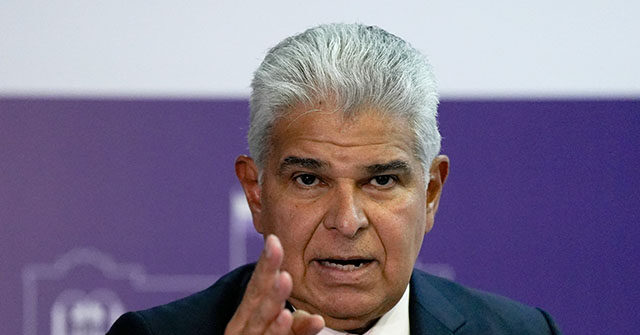Conservative president of Panama José Raúl Mulino stated on Tuesday that he will not respond to President-elect Donald Trump’s statement on taking control of the Panama Canal until Trump takes office on January 20.
Mulino made the assertion in remarks given to the local newspaper La Estrella de Panamá shortly after President-elect Trump refused to tell reporters he would rule out military or economic force to have the United States gain back control of the Panama Canal.
Mulino reportedly reminded Trump that the Panama Canal “has been a facilitator of the U.S. economy” and that U.S. exports and imports are “closely related to the operation of the canal.”
In December, Trump started an ongoing debate over the Panama Canal, an interoceanic waterway built by the United States in 1914. Control of the Canal was handed over to Panama in 1999 as per the terms of a deal signed by both nations during the administration of late U.S. President Jimmy Carter in 1977.
Trump accused Panama of imposing “exorbitant” and “rip-off” transit fees on U.S. ships, and asserted that Chinese soldiers are “lovingly, but illegally” operating the Panama Canal.
Mulino dismissed Trump’s accusations as “nonsense” in his last 2024 weekly press conference and denied that U.S. ships are being “ripped off” by Canal transit fees. He also denied the presence of the Chinese military along the trade route.
“There is absolutely no Chinese interference or participation in anything related to the Panama Canal. There are no soldiers from that nation in the canal, for God’s sake,” Mulino said at the time. “There are no Chinese in the canal, as simple as that. Neither Chinese nor any other power.”
“The whole world is free to visit the canal. If you find a Chinese soldier in the canal, personally, I will recognize President-elect Donald Trump for what he has said on that subject,” he added.
Days before the start of the ongoing Panama Canal debate, Mulino described immigration as a subject on which he and President-elect Trump could engage in “fruitful conversations.” The Panamanian president also hoped that Trump would maintain a U.S.-funded deportation flight agreement that his administration signed in July with the outgoing administration of U.S. President Joe Biden.
Mulino was elected president in May 2024 and took office in July. The Panamanian president successfully ran on a campaign centered around curbing the unprecedented flow of U.S.-bound illegal migrants passing through his country by “closing down” the Darién Gap, a dangerous jungle trail that Panama shares with Colombia and the only existing land bridge connecting South and Central America.
In recent years, hundreds of thousands of Venezuelan, Colombian, Ecuadorian, Chinese, and citizens of other nations transited through the Darién Gap towards the U.S. southern border — prompting Mulino to declare at the United Nations General Assembly that the “new United States border” is in Panama. Upon taking office, Mulino immediately began implementing measures to limit the flow of illegal migrants passing through the dangerous jungle trail.
The policies, some of which have been in place since July, led to a 42-percent reduction in the number of U.S.-bound migrants who passed through the Darién Gap in 2024 when compared to the previous year, according to statistical information from Panama’s Migrant Authority.
In its latest report, Panama’s Migrant Authority stated that 302,203 migrants passed through the Darién jungle trail in 2024, down from 2023’s record-breaking 520.085. Of the total, 69 percent were Venezuela nationals, 5.8 percent Colombians, 5.5 percent Ecuadorians, 4.1 percent Chinese, and 3.9 percent Haitian nationals.
Panama, during the administration of former President Juan Carlos Varela, established relations with China and cut ties with Taiwan at the same time, embracing the Chinese Communist Party’s “One-China Principle,” which falsely states that there is only one China in the world and Taiwan is a “province” of China.
A report published in September by the magazine Foreign Policy indicated that, after taking office, Mulino moved quickly to portray Panama as a “strategic partner” of the United States, holding several meetings with the U.S. government — but at the same time not showing “similar affection” for China, the Panama Canal’s second topmost customer.
Christian K. Caruzo is a Venezuelan writer and documents life under socialism. You can follow him on Twitter here.
Read the full article here
